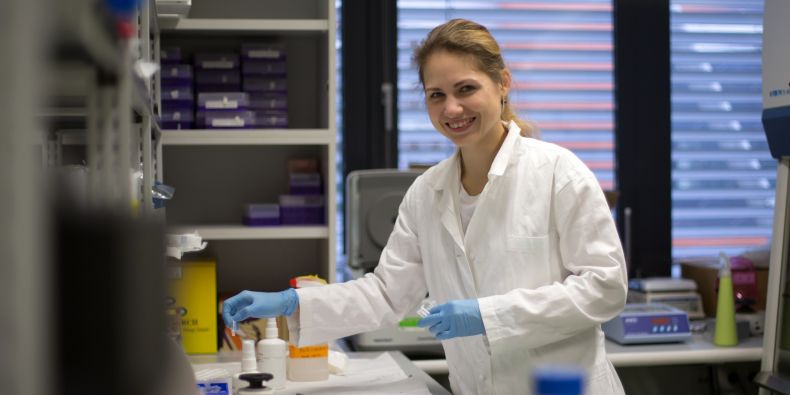Rituximab, an antibody against CD20, has been used for over 20 years in leukaemia and lymphoma therapy. Nevertheless, the function of the CD20 molecule is still unclear. Gabriela Pavlasová, who works at the Masaryk University CEITEC institute and the Department of Internal Medicine, Hematology and Oncology, which is a joint department of the MU Faculty of Medicine and the University Hospital Brno, has been trying to crack this mystery.
Her work has now been recognised with the Discovery Award, which has been given out for the past seven years by Novartis, a Swiss multinational pharmaceutical company, to young researchers under the age of 40. Gabriela Pavlasová, a PhD student from the research group led by Marek Mráz, won the basic research category in this competition. Pavlasová was a member of a team of experts who studied the regulation and function of CD20 in a five-year project. “The molecule is used as a target for monoclonal antibodies, which bind to it and destroy the cancer cell,” explains Pavlasová.
Her team has been focusing on the role of CD20 in chronic lymphocytic leukaemia, which mostly affects older patients while progress and development vary widely from patient to patient.
“Despite continued progress in treatment, this disease is still incurable. However, we are convinced that understanding the function and mechanism of CD20 regulation is key to finding successful therapy for patients with this diagnosis, especially for the development of new and more effective anti-CD20 monoclonal antibodies or for their potential combinations with other active ingredients,” says Pavlasová.
Pavlasová is the first author of two major papers that lay out new findings about the molecule. In the first, the researchers show that the cells of chronic lymphocytic leukaemia carry more CD20 molecules when they are migrating from the lymph nodes to the bloodstream. The second was published last year and describes the role of the molecule in B-cell receptor (BCR) signalling, which stimulates growth in healthy cells.
However, excessive BCR activity is typical of cancer cells. Rituximab primarily targets cells with a high number of CD20 molecules and high BCR activity, which are the most aggressive cells of chronic lymphocytic leukaemia. This is probably the reason it is so effective in fighting this disease. The research team is currently studying which new drugs could be combined with the anti-CD monoclonal antibodies to achieve the best effect.
Gabriela Pavlasová graduated in molecular biology and genetics at the MU Faculty of Science and is now working towards her PhD at the MU Faculty of Medicine. She is keen to stress that the award is recognition of the work of her whole team, which she describes as a close-knit group of people who are friends as well as colleagues. “I like to spend my free time actively with my friends, who are my colleagues from the lab. We go on trips or to the theatre, play sports or go to eat out together,” she says.
She also says that her personal favourite pastime is reading, adding: “However, my go-to way to de-stress and forget about any work-related issues is yoga, which I practice several times a week.”
